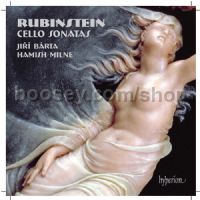Cello Sonatas (Hyperion Audio CD)
Cello Sonatas (Hyperion Audio CD)
Special Offer
* Estimated price converted from UK retail price
Remembered today principally as one of the greatest of all nineteenth-century piano virtuosos, Rubinstein was also a
celebrated composer in his day who produced a large number of works with an enviable ease and fluency. His two
Cello Sonatas are recorded here by Czech cellist JiÚí Bárta and Romantic specialist Hamish Milne on a thoroughly
enjoyable new disc.
Rubinstein was only in his early twenties when he composed the Cello Sonata No 1 in D major Op 18 in 1852, but it
is a fairly substantial work which not unnaturally requires a pianist of heroic stature as well as a first-rate cellist. If
Rubinstein’s idiom is more reminiscent of Mendelssohn than Russian folk-melody, he still contrives to sound a personal
note with touches of Slavic ardour. The Cello Sonata No 2 in G major Op 39 was composed in 1857, though Rubinstein
revised it some years later. This is a larger, more ambitious conception than the D major sonata, with a true scherzo and
slow movement as well as sonata-form first movement and finale. In fact, though the sonata-form outlines of the first
movement are clear, the movement has fantasia-like aspects, developing episodes that concentrate on one motif or
another, and with cadenza-like effusions for the two instruments at different times. The cello’s opening theme is
generously long-spanned, almost Brahmsian.
The repertoire of nineteenth-century cello music is rich, but not so extensive that these two sonatas by Rubinstein
should continue to be so neglected. They are both delightful works, and the second sonata especially deserves a regular
place in recital programmes.




